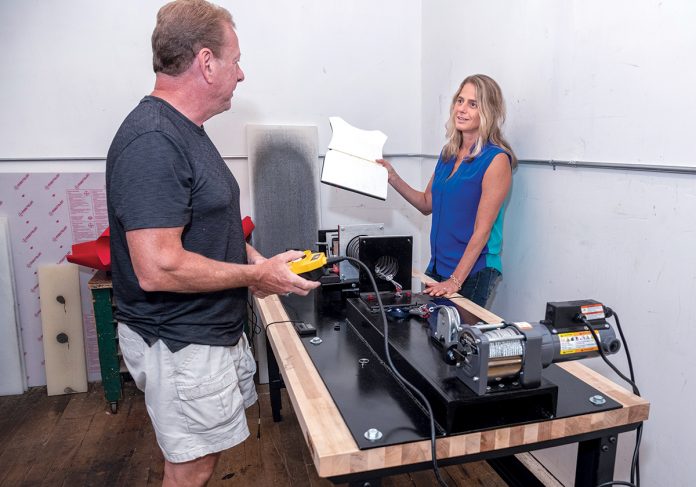All forms of activism – from riots to demonstrations, rallies and protests – have colored the 18-plus months since President Donald Trump’s administration took office in January 2017.
Some of these public gatherings have been overseen by security forces in body armor and one Rhode Island company is looking to carve out a niche in the engineered-textiles industry with a new “stab-proof” composite for riot suits its developing with the aid of R.I. Commerce Corp. Innovation Vouchers.
Over the past two years, Amerisewn, a division of 12-year-old Desmark Industries, based in Cranston, has increasingly devoted more and more of its resources to engineering protective textiles for riot suits, explained CEO John Caito III, and in line with a nationwide call for more such technology.
According to an IBISWorld August 2017 report, after five years of falling demand from 2010 to 2014, body armor spending – riot suits included – is expected to rise. Domestic spending was $527.2 million in 2017 and the report estimates it will continue its rise to $654 million by 2022. IBISWorld calculates domestic demand by adding imports to industry revenue and subtracting exports.
The Los Angeles-based industry market research firm expects textile-engineering employment to rise with demand. Nationwide, 2,528 workers were employed in the sector in 2017 and IBISWorld expects that to grow to 2,759 by 2022. However, by its count, this remains lower than the 4,720 individuals employed by the industry in 2008.
“I’ve been reviewing what’s out there and nothing is adequate” to protect military personnel or security forces, said Caito.
The main reason he pinpointed is a lack of proper protective textiles. Without those materials, he said, “You’re going to fail.”
The company, which originally produced combat-training equipment, including boxing gloves, is entering the protective-textiles market under the brand Amerisewn, emphasizing its products are engineered and manufactured in the United States.
“You’re hard-pressed to find a riot suit made in the U.S. today,” said Layne Mayer, a consultant for Amerisewn and owner of Providence’s Dynamo Business Consulting. Mayer provides operational, personnel and brand-building expertise to the firm.
The firm’s investment was initially put in motion through the first of two Innovation Vouchers – $49,896 awarded in May 2017. The grant funded a partnership with the University of Rhode Island to research efficacy of existing equipment as well as material selection and development of body armor textiles that can withstand anything from nonweapon combat to knife attacks and bullets.
‘You’re hard-pressed to find a riot suit made in the U.S. today.’
LAYNE MAYER, Dynamo Business Consulting owner and Amerisewn consultant
That time was spent understanding the market for riot suits, textiles already used in the production of such suits and the response to what’s currently available, said Mayer.
According to Amerisewn’s application, a second Innovation Voucher – $49,832 awarded in June – and new Commerce RI guidelines allowed it to bring research and development of a “stab-proof and impact-resistant composite panel for a … riot suit” in-house.
“Now that we have a knowledge base and a path,” thanks to time spent with URI, said Mayer, “How do we make [the desired product] manufacturable?”
The goal, explained Mayer, is to create a riot suit that protects the individual while allowing for ease of movement. Calling current models “heavy, tricky to put on” and “aggressive-[looking],” Mayer said Amerisewn’s design looks to improve on existing models’ “quality and functionality” and help those wearing it feel more protected.
“If [security personnel] feel confident [in the suit], they’re less likely to be aggressive,” she said.
While the composite is still being engineered, Mayer said an Amerisewn-engineered suit can be expected on the market within the year.
Caito said the return on his investment has been exponential for Desmark, which employed 20 workers in 2017 and doubled its payroll to 40 this year. However, Caito isn’t done adding jobs. He expects to hire 10 to 15 more workers in the protective-textile department “within a year.”
“There’s quite a market out there for us,” Caito said, adding once the suit is in production, Amerisewn looks to expand into elbow pads, knee pads and helmets.
Asked what sets Rhode Island apart, Caito said “the workforce,” especially employees with backgrounds in the “sewing” trades.
Citing Rhode Island’s historic commercial ties to military defense and textile-production industries, Christine Smith, Commerce RI’s managing director of innovation and head of the Innovation Voucher program, said Amerisewn’s pursuit of and entry into the protective-textile industry leverages centuries of local expertise.
“We have everything from spinning and weaving at Slater Mill” to more-advanced production facilities from the 19th and 20th centuries, she said.
Calling Rhode Island “a hub for advanced textiles,” she said Amerisewn’s endeavor to engineer more-advanced riot suits “is a great example of building on our heritage and keeping [up] with global needs and a changing society.”













